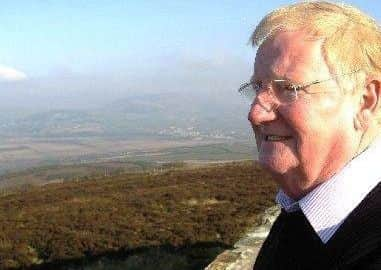Back channel used by MI6 told the IRA to bomb economic targets
and live on Freeview channel 276
Brendan Duddy, the Londonderry businessman who was a critical behind the scenes link in what would become the peace process, gave the advice to the IRA in the 1970s.
Mr Duddy, who believed in talking to all sides in an attempt to stop the killing, died two years ago but his diaries are held at the National Union of Ireland in Galway.
Advertisement
Hide AdAdvertisement
Hide AdTonight’s BBC Spotlight on the Troubles reveals that in his diaries Mr Duddy described Mr McGuinness — a man he would go on to see as crucial to peace and whose elevation to deputy First Minister would delight him — as something of an aggressive militarist.


In one diary entry, Mr Duddy described the then IRA commander as a “little Hitler” determined to run the IRA across Ireland rather than simply in his native city.
Duddy wrote in his diaries that he had recommended to the IRA that they bomb a number of economic targets in England and Northern Ireland.
He stressed that “no lives should be lost”, seemingly because he believed it would make the British government come to terms with the IRA.
Advertisement
Hide AdAdvertisement
Hide AdHowever, when the IRA resumed its bombing campaign, there were deaths.
The programme also reveals that Mr Duddy was at the heart of a secret plan to minimise bloodshed in Londonderry in 1972 by removing about 50 IRA weapons from the city ahead of Operation Motorman, the Army’s massive operation to end the ‘no-go’ areas in the city.
Tonight’s programme also contains an interview with Robert Armstong, the private secretary to Prime Minister Harold Wilson when the Sunningdale Agreement collapsed in the face of the Ulster Workers’ Council strike in 1974.
Lord Armstrong, who would go on to become cabinet secretary under Margaret Thatcher, said of the strike: “Mr Wilson was not prepared to do what one would have had to do if you were going to overcome Ulster Unionist objections to it. Heath might have been [willing to do so].”
Advertisement
Hide AdAdvertisement
Hide AdLord Armstrong, who is now 92, also said that in the 1970s the government believed it was its “duty” to take part in secret talks with IRA lest a way could be found to prevent bloodshed.
Former IRA leader Billy McKee said that he had met with British representatives over a dozen times and was “convinced they were very serious”, with the possibility of British withdrawal on the table.
The programme also contains footage of IRA members being trained and then taking part in a bombing. The footage, which Spotlight said had never been broadcast, was for an American programme called Secret Army and was filmed at the point in the early 1970s where the IRA believed it was on the brink of victory.
Last week Spotlight broadcast footage from the same film which showed Martin McGuinness taking part in a car bombing.
Advertisement
Hide AdAdvertisement
Hide AdAn Anglican minister has said that when he and other clerics secretly met the IRA in December 1974 they were doing so on behalf of the government.
The Rev Ralph Baxter and seven other Protestant clergymen met the IRA leadership at a hotel in Feakle, County Clare, but the meeting failed when Garda raided the hotel.
The Rev Baxter, now an elderly man, was forced to flee to Canada after UDA threats in the wake of the talks being revealed.
Speaking for the first time about the incident, he told Spotlight that the clerics had “Harold Wilson’s blessing”.
Advertisement
Hide AdAdvertisement
Hide AdHe said: “We met with them on behalf of the British government...we didn’t have any other role.”
He said that the IRA leadership “wanted peace because they wanted out; why they wanted out is another thing altogether”.
l The second episode of Spotlight On The Troubles: A Secret History will be shown tonight at 9pm on BBC One NI and BBC Four